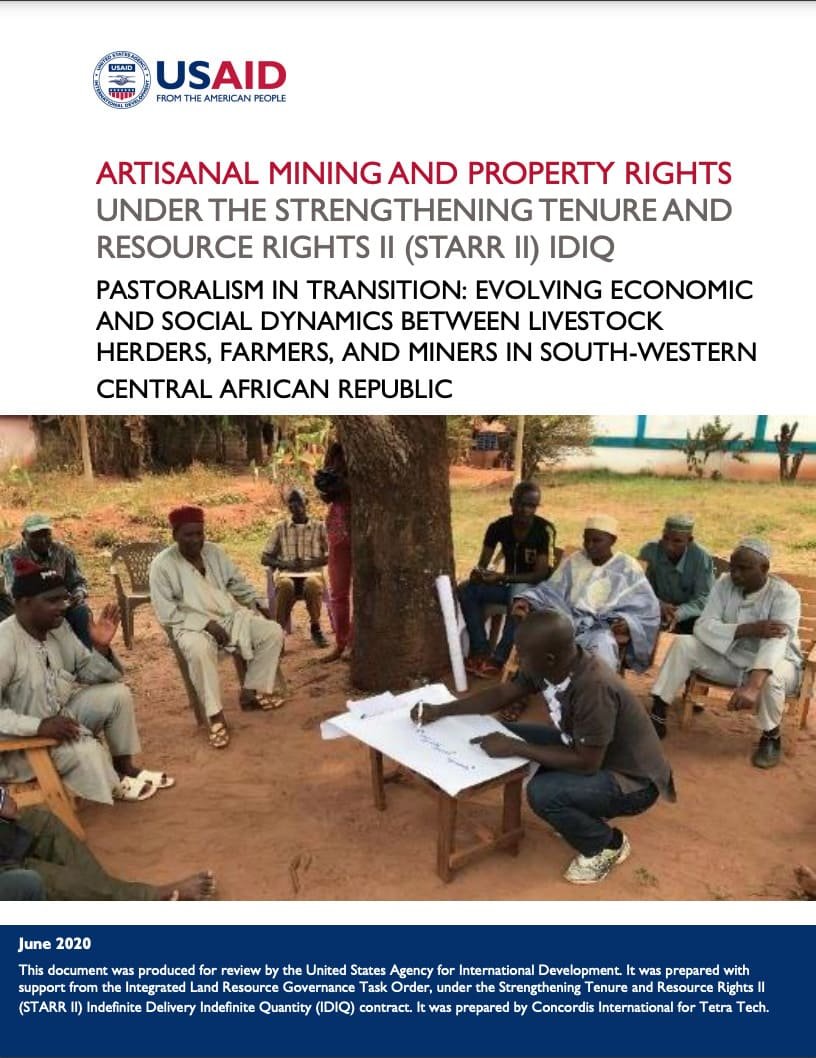Reports
Filter by Programme:
Filter by Issue:
Filter by language:
Search Reports
Promouvoir une Transhumance Apaisée dans le Nord de la République Centrafricaine
Ce rapport s’appuie sur les résultats des consultations menées auprès de 4220 personnes entre décembre 2023 et février 2024, par Concordis International (Concordis), dans les préfectures de Vakaga, Bamingui-Bangoran, Lim-Pendé et Ouham-Pendé, ainsi que dans la sous-préfecture de Markounda (préfecture de Ouham).
Promoting Peaceful Transhumance in the North of the Central African Republic
This report is based on the results of consultations with 4,220 people carried out between December 2023 and February 2024 by Concordis International in the prefectures of Vakaga, Bamingui-Bangoran, Lim-Pendé and Ouham-Pendé, as well as in the sub-prefecture of Markounda (Ouham prefecture).
Rapport sur la cohésion sociale & cartographie des infrastructures en Ouham Pendé
L'état des infrastructures liées à la transhumance dans la préfecture de l'Ouham Pendé. Comprend des cartes et des recommandations qui traitent des conflits entre éleveurs et agriculteurs autour de la transhumance.
RELSUDE Project Report: Ouango
This French language report, written by Concordis as part of the RELSUDE project, examines conflict dynamics in the town of Ouango in the southeast of the CAR. The report, finalized in October 2021, forms part of a series of 11 reports exploring the causes of conflict and community perception in the southeast of the country.
RELSUDE Project Report: Satema
This French language report, written by Concordis as part of the RELSUDE project, examines conflict dynamics in the town of Satema in the southeast of the CAR. The report, finalized in October 2021, forms part of a series of 11 reports exploring the causes of conflict and community perception in the southeast of the country.
RELSUDE Project Report: Obo
This French language report, written by Concordis for the RELSUDE project, forms part of a series of 11 reports analyzing conflicts in 11 select towns in the southeast of the Central African Republic. The purpose of the reports is to inform the supporters of the project of the realities on the ground in the CAR. This particular report, published in November 2021, analyses the conflict dynamics and community perceptions in the town of Obo.
RELSUDE Project Report: Zemio
This French language report, written by Concordis as part of the RELSUDE project, examines conflict dynamics in the town of Zemio in the southeast of the CAR. The report, finalized in October 2021, forms part of a series of 11 reports exploring the causes of conflict and community perception in the southeast of the country.
RELSUDE Project Report: Mobaye
This French language report war written as a part of the RELSUDE project. Concordis was tasked with conducting conflict analysis in 11 select towns in the southeast of the Central African Republic with the aim of informing the supporters of the project with the realities on the ground. This particular report analyses the conflict dynamics and community perceptions in the town of Mobaye.
RELSUDE Project Report: Kouango
This French language report, written by Concordis as part of the RELSUDE project, examines conflict dynamics in the town of Kouango in southeastern CAR. The report, finalized in October 2021, forms part of a series of 11 reports exploring the causes of conflict and community perceptions in the southeast of the country.
RELSUDE Project Report: Kembe
This French language report, written by Concordis as part of the RELSUDE project, examines conflict dynamics in the town of Kembe in southeastern CAR. The report, finalized in November 2021, forms part of a series of 11 reports exploring the causes of conflict and community perceptions in the southeast of the country.
RELSUDE Project Report: Gambo
This French language report, written by Concordis as part of the RELSUDE project, examines conflict dynamics in the town of Gambo in southeastern CAR. The report, finalized in October 2021, forms part of a series of 11 reports exploring the causes of conflict and community perceptions in the southeast of the country.
RELSUDE Project Report: Bria
This French language report, written by Concordis as part of the RELSUDE project, examines conflict dynamics in the town of Bria in southeastern CAR. The report, finalized in October 2021, forms part of a series of 11 reports exploring the causes of conflict and community perceptions in the southeast of the country.
RELSUDE Project Report: Alindao
This French language report, written by Concordis as part of the RELSUDE project, examines conflict dynamics in the town of Alindao in southeastern CAR. The report, finalized in October 2021, forms part of a series of 11 reports exploring the causes of conflict and community perceptions in the southeast of the country.
RELSUDE Project Report: Bakala
This French language report, written by Concordis as part of the RELSUDE project, examines conflict dynamics in the town of Bria in southeastern CAR. The report, finalized in October 2021, forms part of a series of 11 reports exploring the causes of conflict and community perceptions in the southeast of the country.
Pastoralism in Contested Spaces of Southwest Central African Republic
The Central African Republic’s southwest has become increasingly contested due to competition over natural resources. It is rich in deposits of gold and diamonds, which complicates the historical trust and symbiotic relationships between farmers, livestock herders, and artisanal miners. This report carries out empirical analysis and highlights the role of weak land governance in exacerbating the effects of environmental change and resource scarcity, which in turn lead to conflict.
Pastoralism in transition: evolving economic and social dynamics between livestock herders, farmers and miners in South-Western Central African Republic
Conflicts between livestock herders, farmers, and miners stem from competition for land use. Competition for land use has increased the militarisation of these areas, increasing the risk of conflict. The field research team concludes that the diversification of livelihoods and increased trade amongst these parties are crucial to peacebuilding in the area.



















